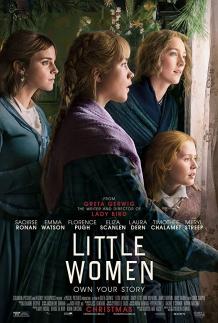Jo March reflects back and forth on her life, telling the beloved story of the March sisters - four young women each determined to live life on their own terms.
"When we first meet Jo March in director Greta Gerwig’s adaptation of Little Women, she is standing outside the door of a newspaper office in New York as an adult, pausing to take a deep breath before entering, as she prepares to sell her first story to the editor.
Cut to Jo running through the streets—showing her free and independent spirit—as she makes her way back to the boarding house where she works as a governess. One by one, Gerwig introduces us to each of the March sisters and their lives as adults, something that makes her adaptation unique from Louisa May Alcott’s beloved nineteenth century novel of the same name, which begins at the peak of their childhood in a small Massachusetts town during the Civil War.
Gerwig opens and ends the film with Jo for a reason. She is not only one of the novel’s main characters, but in Gerwig’s film she also plays the role of narrator. The story jumps back and forth in time, revealing the important events that shaped the March sisters’ unique childhood and their relationship with one another through flashbacks as Jo travels home to be with her sister Beth, who has fallen ill. Telling the story through Jo’s memories is Gerwig’s tribute to Alcott—like Alcott, in the film Jo is an ardent observer of her surroundings and everything that has happened in her life.
In this adaptation, Jo is played by Saoirse Ronan, who captures her fiery spirit and temper perfectly, not only in her words and actions but her body language too—Ronan moves around in every scene and never seems to sit still. Emma Watson gracefully portrays eldest sister Meg, expressing the side of her character that desires pretty things while also emphasizing her poise and thoughtfulness. Shy and kind Beth, played by Eliza Scanlen, beautifully executes some of the most heartbreaking scenes in the film. Timothee Chalamet plays charming boy-next-door Laurie in a more quiet and pensive way than the character has typically been portrayed. Still Chalamet shines showing the joy Laurie feels being around the March sisters, and in particular, his love and admiration for Jo. There’s also Meryl Streep, who is ideal for the role of strict and traditional Aunt March, and Laura Dern, who plays the sisters’ mother, Marmee, just as she is portrayed in the book—as a loving and charitable maternal figure.
The most surprising performance comes from Florence Pugh, who portrays youngest sister Amy. In earlier adaptations and in the novel, she has typically been portrayed as a spoiled and vain child—from here Pugh transforms her into a smart and practical woman as an adult, who is almost similar to Ronan’s Jo in how deeply she feels the limitations placed on her as a woman. Unlike Jo, who rebels by maintaining her independence and imagination, Pugh’s Amy takes a more calculated and practical approach to life, seeing marriage, like Jo, as an economic proposition but also as her only option for security. In one of her most striking lines in the film, Pugh says sarcastically, “I will become an ornament to society,” revealing that even the youngest March is well aware of the expected role of women.
Little Women is a beautiful story about family and love, the creativity and imagination that comes with childhood, and the challenges and sacrifices we make as we grow up. And one of the reasons it has endured for so long is because of the powerful way in which it promotes women and breaks down gendered conventions and limitations by, as Jo puts it so eloquently in the film, showing that women “have souls and minds, as well as just hearts, and they’ve got talent and ambition.”
At the heart of Gerwig’s film is this celebration of feminism. It finds its way in many of the characters, even surprisingly in the saint-like Marmee who reveals to Jo that she has a temper like hers but has learned to control it, carefully adding that “There are some natures too noble to curve and too lofty to bend,” referring to Jo’s unbending will and spirit, which should never be tamed. But Gerwig’s Little Women celebrates women of all different forms, not just the passionate and outspoken Jos of the world.
As the film moves forward, it grows in meaning and depth, mimicking the transition from childhood to adulthood. Life becomes more complicated and difficult to navigate, and Gerwig shows us this. But she also keeps our beloved March sisters together through it all—because their bond as sisters they will never lose. Gerwig’s adaptation becomes a masterpiece at the very end, when she reveals what the real triumph is for Jo and hits home by celebrating her mind and ambition and talent. Beautifully done." - Chicago Reader



